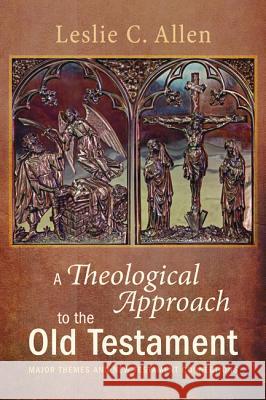A Theological Approach to the Old Testament » książka
A Theological Approach to the Old Testament
ISBN-13: 9781625642493 / Angielski / Miękka / 2014 / 220 str.
A Theological Approach to the Old Testament
ISBN-13: 9781625642493 / Angielski / Miękka / 2014 / 220 str.
(netto: 106,43 VAT: 5%)
Najniższa cena z 30 dni: 110,23
ok. 16-18 dni roboczych.
Darmowa dostawa!
The Old Testament has two great themes: creation and covenant. They embrace subthemes: wisdom in the case of creation; Israel's religion and the Davidic covenant under the general umbrella of covenant; and internationalism, which mostly develops the theme of covenant and partly the theme of creation. These topics cluster around a common center: Yahweh, the God of the Old Testament. This God is portrayed in different roles, which have attached to them role expectations for both Yahweh and those with whom he assumes relationship. Through contextual exegesis of key texts, we come to understand these roles and associated themes. While the Old Testament has its own distinctive contributions to make to divine revelation, much of its material is reused in the New Testament to explain and validate the New Testament message. By concentrating on the Old Testament, we learn to appreciate the enormous debt the New Testament owes to the Old in clarifying New Testament theological and moral perspectives. ""This marvelous book grew out of a course of lectures expounding a 'Biblical Theology of the Old Testament for Pastors.' Who better than my colleague, Leslie Allen, to write on this subject? He loves the Old Testament and he has a pastor's heart (every Friday he puts his Hebrew Bible down and visits our local hospital as a chaplain). No danger that this volume will either sell the reader short on the inherent significance of the Old Testament or sell the reader short on its significance in the context of Christian faith. And it does indeed fulfill both of those expectations."" --John Goldingay, Fuller Seminary, Pasadena, CA Leslie C. Allen is Senior Professor of Old Testament at Fuller Theological Seminary in Pasadena, California. His most recent books are A Liturgy of Grief: A Pastoral Commentary on Lamentations (2011), Jeremiah (Old Testament Library, 2008), Ezra, Nehemiah, Esther (New International Biblical Commentary, 2003), and Psalms 101-150 (Word Biblical Commentary, 2002).
The Old Testament has two great themes: creation and covenant. They embrace subthemes: wisdom in the case of creation; Israels religion and the Davidic covenant under the general umbrella of covenant; and internationalism, which mostly develops the theme of covenant and partly the theme of creation.These topics cluster around a common center: Yahweh, the God of the Old Testament. This God is portrayed in different roles, which have attached to them role expectations for both Yahweh and those with whom he assumes relationship. Through contextual exegesis of key texts, we come to understand these roles and associated themes.While the Old Testament has its own distinctive contributions to make to divine revelation, much of its material is reused in the New Testament to explain and validate the New Testament message. By concentrating on the Old Testament, we learn to appreciate the enormous debt the New Testament owes to the Old in clarifying New Testament theological and moral perspectives.""This marvelous book grew out of a course of lectures expounding a Biblical Theology of the Old Testament for Pastors. Who better than my colleague, Leslie Allen, to write on this subject? He loves the Old Testament and he has a pastors heart (every Friday he puts his Hebrew Bible down and visits our local hospital as a chaplain). No danger that this volume will either sell the reader short on the inherent significance of the Old Testament or sell the reader short on its significance in the context of Christian faith. And it does indeed fulfill both of those expectations.""--John Goldingay, Fuller Seminary, Pasadena, CALeslie C. Allen is Senior Professor of Old Testament at Fuller Theological Seminary in Pasadena, California. His most recent books are A Liturgy of Grief: A Pastoral Commentary on Lamentations (2011), Jeremiah (Old Testament Library, 2008), Ezra, Nehemiah, Esther (New International Biblical Commentary, 2003), and Psalms 101-150 (Word Biblical Commentary, 2002).











